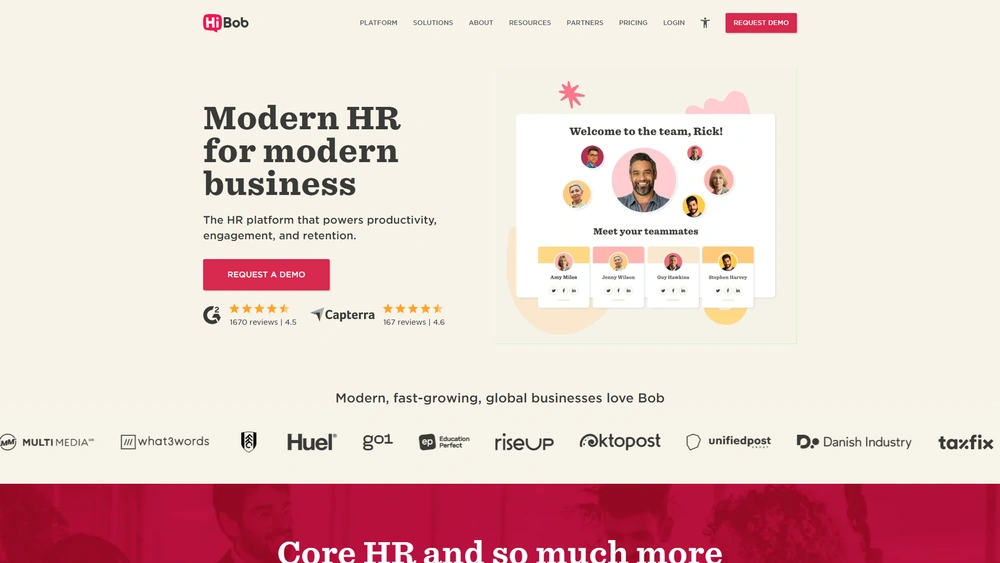HiBob Overview & 2026 Industry Position
HiBob is a modern HR platform designed for mid-sized companies navigating rapid growth and global operations. In 2026, HiBob distinguishes itself by offering unparalleled localization for global teams, workflow customization, and frictionless integrations—positioning itself not just as an HRIS, but as a flexible operating system for people management. As hybrid work dominates the new normal, HiBob has emerged as a preferred partner to support agile, high-growth companies looking to scale with clarity and culture intact.
From Launch to 2026: HiBob’s Journey
Founded in 2015, HiBob emerged as an HRIS alternative for modern, dynamic businesses. Soon after its debut platform, Bob, the company doubled down on user-driven design and culture-focused features. Key milestones include:
- 2017: Platform globalizes with multilingual and multi-currency support
- 2019: Introduces performance management and OKR modules
- 2021: Achieves unicorn status after Series C funding
- 2022: Launches pre-built workflows and seamless integration marketplace
- 2024: Wins G2 Leader in Core HR, Mid-Market, and Global HR
- 2025: Expands with AI-powered people insights and EOR-ready modules
HiBob’s 2026 strategy centers on serving globally distributed, culturally diverse companies with tools that adapt to the way every workforce works.

HiBob Key Features
Unlike legacy HR platforms, HiBob is modular, highly visual, and ideal for scaling, global-first firms. Major features include:
- Core HR: Onboarding, org charts, document management
- Time & Attendance: Configurable PTO policies, shift tracking, geo tagging
- Performance & Goals: OKRs, reviews, 360 feedback, engagement surveys
- Compensation Management: Salary reviews, benchmarking, bonus cycles
- Customization: Workflows, permission sets, time zones and locale settings
- Global Ops: Country-specific compliance settings and policies
- Analytics: AI-powered people reports and headcount forecasting
Workflow & UX
HiBob’s interface is intuitive and heavily focused on user experience. From dynamic people directories to visual org charts and local policy automations, it simplifies HR processes while maintaining transparency. Visual reports and Slack/Teams integrations make it easy for managers to approve PTO, track performance reviews, and onboard new hires without leaving their workflow tools.
Pro Tip: Use HiBob’s Workflow Builder to automate multi-step approvals like new hire IT provisioning or remote onboarding sequences by location.
HiBob Pricing Analysis & Value Metrics
HiBob uses a custom-quote model, but average rates are transparent by tier as of July 2026:
| Plan | Monthly Rate (est. 100 users) | Includes |
|---|---|---|
| Essential | $8–$12/user | Core HR, self-service portal, workflows, analytics |
| Growth | $13–$18/user | + performance, surveys, compensation tools |
| Enterprise | $19+/user | + global compliance tooling, API access, SSO |
Cost-effective for companies over 50 employees; most value unlocks between 100–500 employees when teams are globally scaling and complexity grows exponentially.
Competitive Landscape
| Platform | Best For | Key Differences |
|---|---|---|
| HiBob | 100–1,000 employees | Global features, strong UX customization, cultural focus |
| BambooHR | Startups to SMBs (10–250) | More basic features, U.S.-centric model |
| Rippling | Tech-centric orgs, 25–500+ | Stronger IT/payroll bundling; less culture-oriented |
| Workday | Enterprise 1000+ | Robust ERP, but cost and complexity are hurdles |
HiBob Integrations
HiBob integrates with over 60 third-party tools, including:
- Slack, Microsoft Teams
- Greenhouse, Lever, Workable (ATS)
- Salesforce, NetSuite, QuickBooks
- Deel, Remote, Papaya Global (EOR/payroll)
These integrations power a connected HRIS ecosystem, reducing friction between hiring, payroll, IT, and compliance units.
Use Cases
HiBob is particularly effective for:
- Tech startups expanding from 50 to 500 global employees
- Consulting firms managing international service teams in >5 countries
- Retail firms with seasonal workers and shift compliance needs
- Private equity rollups needing unified reporting for disparate orgs
Visual HR & Scaling with HiBob
Pros & Cons
- Pros:
- Excellent global compliance support across 90+ countries
- Custom workflow builder for HR automations
- Intuitive UX with admin-accessible tweaks
- Pre-built integrations with major tools
- Cons:
- Per-seat pricing can add up at higher scale
- Learning curve for deep customization
- Some limitations in benefits administration (U.S.)
Final Thoughts
HiBob is ideal for mid-market companies scaling across geographies with diverse HR infrastructure needs. While it may be overkill for tiny startups, its value compounds dramatically for orgs facing complexity, regulatory friction, and cultural fragmentation. With strong flexibility, clean design, and growing AI analytics, HiBob is defining what a post-COVID, global-ready HRIS looks like in 2026.
HiBob FAQ
While HiBob can support smaller companies, the real ROI is seen at 50+ users where processes and global considerations start to increase.
Yes, HiBob integrates with payroll providers like Papaya Global, Remote, Deel, and more for automated syncing of employee data.
Absolutely. Users can create tailored onboarding sequences based on geography, department, or role.
Yes, with robust support for location-specific policies, time zones, languages, and holiday calendars, HiBob excels at localizing experiences.
Through integrations with Deel and Remote, HiBob can support EOR-based team structures and data flows seamlessly.

